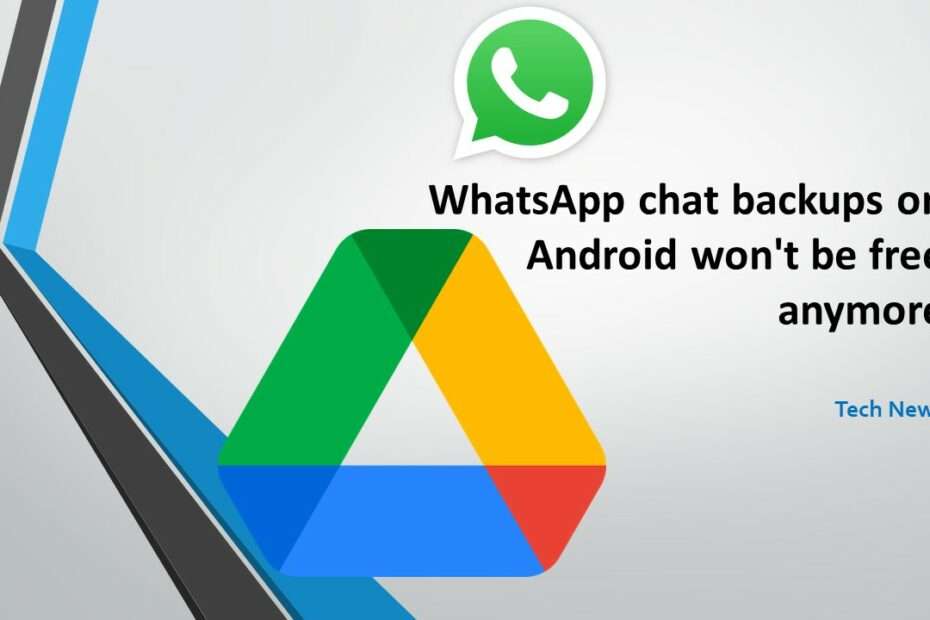Setting up WhatsApp on a new Android phone is a seamless process. Once you purchase a new device, the transition becomes effortless. Simply log in to your WhatsApp account, and during the setup, agree to transfer your cloud backup to the new device. This straightforward step ensures that all your chats, media, and other data seamlessly download to the new device, providing you with a hassle-free experience as you switch to your upgraded Android phone.
The user-friendly approach of WhatsApp’s setup process simplifies the migration of data, making it convenient for users to access their chat history and media on a new device. The integration of cloud backups streamlines the transfer, ensuring that the transition is quick and efficient.
For a considerable period, Android users have enjoyed free WhatsApp chat backups, a perk not extended to users on other platforms. However, this longstanding practice is set to change come December this year. According to a recent announcement from Google, WhatsApp chat backups will no longer be exempt from your Google account storage quota. This shift signifies a departure from the previous arrangement and emphasizes the need for users to be mindful of their storage usage as they continue to rely on WhatsApp for their messaging needs.
If you are not subscribed to Google One or a comparable cloud storage service from Google, your available free data is capped at 15GB. It’s crucial to note that this 15GB allocation encompasses not just WhatsApp chat backups but also data from Gmail, Google Photos, and various other Google applications. With the upcoming change in WhatsApp’s backup policy, your chat backups will contribute to this limited storage space. Depending on the duration of your WhatsApp usage and the amount of media shared within the platform, your backup file could potentially be substantial. As a user, understanding the implications of this shift and considering your storage needs becomes paramount to ensure a seamless and uninterrupted experience with WhatsApp.
For users relying on the complimentary 15GB of storage from Google, encompassing various services like Gmail and Google Photos, the inclusion of WhatsApp chat backups introduces a new dimension to storage management. As chat backups become part of the quota, users should assess their storage usage, especially if they’ve been using WhatsApp extensively or sharing a significant amount of media. This impending change prompts users to be proactive in managing their data, exploring storage solutions, or considering alternative backup strategies to accommodate the evolving storage landscape.
If you anticipate that your WhatsApp backup is going to be substantial, there are three main courses of action to consider. First, you can choose to opt out of cloud backups altogether. This can be easily accomplished by navigating to Settings, then Chats, and finally Chat backup. From there, you can change the Backup to Google Drive setting to “Never“. However, it’s crucial to recognize that taking this route comes with a trade-off – in the event of losing or breaking your current phone, you risk losing all your data since there won’t be a cloud backup to restore from.
For those dealing with massive WhatsApp backups, the second option involves actively reducing the amount of data included in your backup. This may include deleting unnecessary chats, media, or files to trim down the overall size of your backup. Lastly, if you find that neither of these options suits your needs, the third alternative is to invest in a cloud storage upgrade, such as Google One, to expand your storage capacity and accommodate the growing size of your WhatsApp backup. Each option has its considerations, and users should choose the one that aligns best with their preferences and priorities regarding data security and accessibility.
Taking steps to minimize the size of your WhatsApp backup involves meticulous review and management of your chat history and media content. This process may be time-consuming, requiring users to evaluate the significance of each item in their backup. The challenge lies in deciding which chats and media to retain and which to delete, especially when faced with sentimental or valuable content. However, this hands-on approach allows users to have more control over their data and storage, ensuring that the backup is optimized to their preferences and priorities.
Responding to the upcoming changes in WhatsApp chat backup policies presents users with various options. If you’re unwilling to compromise on your existing backup or face the risk of losing data, one straightforward solution is to invest in additional Google storage. While this option isn’t free, it provides a practical way to expand your storage capacity. Google offers a $1.99 monthly plan, providing 100GB of data, which should be ample for most users to accommodate their WhatsApp chat backups. Choosing this option ensures that your data remains secure and accessible without the need to make sacrifices or delete valuable content.
Considering the implications of the new backup policy, users are left with the decision of how to adapt to the changes. Whether you opt for the simplicity of paying for additional Google storage or explore alternative strategies like reducing the backup size or opting out of cloud backups entirely, it’s crucial to align your choice with your storage needs and preferences. Each option comes with its considerations, and users should weigh the trade-offs to determine the most suitable approach for maintaining a seamless and secure WhatsApp experience.
Maybe you liked other articles?

